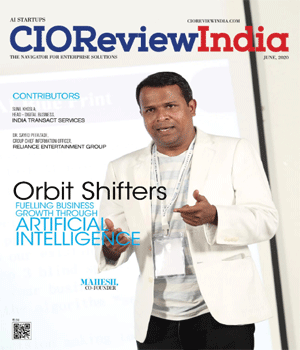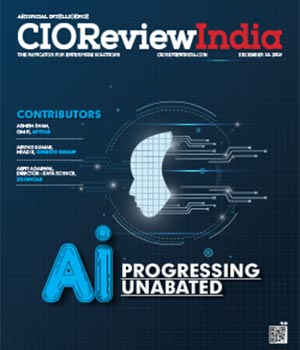
Building Trust in AI: Transparency and Accountability for CIOs
Rejith P R, Correspondent, CiotechOutlook | Wednesday, 13 March 2024, 10:49 IST
 The Indian government issued an advisory for social media and other platforms last week to mark under-trial AI models and prevent hosting inappropriate content. The minister of Electronics and Information Technology has given a strict warning in the event of non-compliance, and the platforms associated with the AI model through its system do not allow users to showcase any unlawful content as per advisory. They also have to get approval from the government for deploying under trial AI models, and they have to deploy them after showing them that the content may not be 100 percent genuine. From the users point of view they have to get it checked with sources for credibility so they can also be accountable.
The Indian government issued an advisory for social media and other platforms last week to mark under-trial AI models and prevent hosting inappropriate content. The minister of Electronics and Information Technology has given a strict warning in the event of non-compliance, and the platforms associated with the AI model through its system do not allow users to showcase any unlawful content as per advisory. They also have to get approval from the government for deploying under trial AI models, and they have to deploy them after showing them that the content may not be 100 percent genuine. From the users point of view they have to get it checked with sources for credibility so they can also be accountable.
The Union Minister stated that they are not planning to take complete control but rather highlight that not all platforms on the internet are sustainable for the community.
Continuous Monitoring and Adaptation
Even though there is trust regarding AI systems, it is crucial to have a continuous process in which tracking and modification should be involved. The CIOs should put effective methodology into practice to monitor the performance of AI systems, find potential biases and evaluate the decision-making process results. With this, the process is never-ending, and the other step is to track the review and make the changes accordingly to deal with current challenges, add the latest feedback, and alter the AI framework to meet current ethical norms. More importantly, the CIOs have to keep an eye on the emerging trend in AI technology to see what best works for their firm in ethical AI adoption.
For instance, Google's search engine leverages AI algorithms to frequently monitor and modify its ranking methods to ensure users get the latest information on their platform. The algorithms can track users' behavior and content quality to refine list items.
Ethical Considerations
Irrespective of any technology, whether AI, machine learning, or whatever it is, fair practices should be followed to avoid adverse effects and get the most out of it. The CIOs need to comprehensively understand how this AI impacts the overall business operations, and it is imperative to give more importance to the ethical part of the development process. Several issues are involved, such as confidentiality of data, fairness, and inclusivity. To stay active in this contemporary business landscape, CIOs have to add ethical principles to AI technology so that the firm can build a strong reputation and minimize challenges. Moreover, they have to work closely with the legal team to come up with legal guidelines that line up with the company's values.
For example, Microsoft's Responsible AI program make sure that the firm's AI system follows ethical standards. They have used guidelines and systems for AI development in terms of privacy, security, and accountability.
FaizShakir, VP & Managing Director – Sales, Nutanix said "Distributed AI deployments require effective data management strategies to ensure data privacy, security, and compliance"
Transparency in AI Decision-Making
Advanced AI technology plays a pivotal role in the decision-making process for several organizations across diverse industries. In the present scenario, it has become unavoidable and is effectively utilized by the CIOs. Aspiring CIOs should learn end-to-end transparency to make it easier to understand how AI algorithms reach conclusions. More importantly, it is inclusive of delivering clear-cut insights into the data sources, algorithms, and logic underlying AI-driven judgments. It is also essential that the CIOs put certain measures into practice, such as the documentation of algorithms, model explainability, and the dissemination of ethical principles, in order to accomplish transparency. Organizations have to ponder easily operated interfaces that enable potential investors to deal with AI models, contributing to decision-making.
IBM uses AI systems for the decision-making process and delivers several AI-powered solutions, including Watson, which is effectively used across diverse sectors to make the decision process seamless and automated.
Accountability in AI Systems
AI technology is held responsible for its actions, which is a vital aspect of trust in it. Appropriately harnessing the technology helps CIOs potentially find the errors and rectify them. The system’s in AI technology that comprises a surveillance mechanism, an evident line of duties, and frequent assessments of AI system performance to establish accountability. To make the process seamless in the organization, the CIOs need to take the initiative to partner with all departments, including compliance, legal, and experts, to establish accountability requirements for AI implementation. Organizations need to be highly responsible to make AI accountable so that they can showcase their commitment to legal AI practices, which will build trust among participants and potential investors.
Social media platform Facebook has executed measures to make sure accountability in the deployment process of AI technologies, predominantly for the purpose of content moderation and user privacy.
All in all, careful consideration has to be given to building trust in AI, as it contains heaps of challenges that need a comprehensive approach to deal with. The CIOs are the key to bringing transparency, legal practices, and accountability to AI frameworks. What matters most is that these principles have to be adopted in the organization. By building a culture of trust, the firm can unleash the potential of AI while keeping the boldness of the audience, workforce, and other communities. It is high time to bring the fair practices of AI into the working world, which has become a part and parcel of modern business.
CIO Viewpoint
Harnessing the Power of AI and ML for Business...
By Vinod Subramanyam, Managing Director, Brillio
The Key to Achieving Real-time AI: Optimizing...
By Mukundha Madhavan, APAC Tech lead, Datastax
Smart Payment Solutions: The Role of AI and IoT...
By Manoj Varma, Head - Payments, Lyra Network, India
CXO Insights
Navigating the Ethical Frontier: Transforming...
By Varun Shah, Software Development Manager, Amazon Services LLC
AI and Sustainability Forge the Future of Tech...
By Ajeya Motaganahalli, VP - Engineering, and MD, Pure Storage India
Maximizing Customer Satisfaction with AI-Driven...











.jpg)
.jpg)
.jpg)







